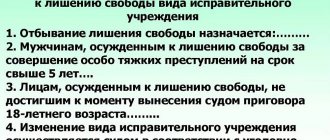Punishment such as imprisonment is quite often used in criminal law. However, people who are far from jurisprudence are not aware of its essence. For example, for a long time I did not know what the difference was between restriction and deprivation of liberty. After my friend began to face criminal liability in the form of imprisonment, I became well versed in all the nuances of this punishment.
In this article I will talk about how deprivation of liberty is interpreted from a legal point of view. Information will be presented on the basis of the relevant legislative act from the Criminal Code. In addition, the topic of the maximum period of validity of this sanction will be touched upon.
Imprisonment under the Criminal Code of the Russian Federation
Article number 56, which is located in the Criminal Code, states what deprivation of liberty is, as well as what the period of validity of this sanction is. In order to deprive an individual who has violated the law, he is isolated from society. They can be isolated in different places. For example, it could be a special colony settlement. Also, an offending individual may be sent to educational colonies.
In addition, convicts can serve imprisonment in correctional institutions that have a medical profile. They can also be isolated in colonies of various regimes (general/strict/particularly strict). Also, quite often individuals are sent to prison for the duration of the sentence.
After the judge makes a decision on the length of the period for which the offending individual will be deprived of his liberty, he is immediately isolated from society in a specially designated institution.
Also, the first paragraph of article number 56 states in what situations imprisonment can be imposed. If an individual has crossed the line of the law for the first time in his life, and the crime he committed was of minor gravity, then he can be deprived of his freedom only if there are aggravating circumstances.
As for the circumstances that aggravate the punishment, they are all listed in article number 63 of the Criminal Code. However, there are a number of crimes that constitute exceptions. First of all, these are violations of the first paragraph 228 of the act, as well as the first part of article number 231. In addition, legislative act number 233 of the Criminal Code also belongs to the same category.
I would like to draw your attention to the fact that a special special part has been approved for some legislative acts. It came into force on June 13, 1996 on the basis of Federal Law No. 63. An individual who has stumbled for the first time and committed a minor offense can be deprived of liberty only if this is the only type of punishment under the relevant article and it is approved by this special part.
Many individuals who are facing imprisonment are very interested in the question of what is the minimum and maximum period for this sanction. The second part of the same Article 56 states that the shortest period is two calendar months. As for the maximum period of validity of this sanction, it is twenty years.
It should be noted that the third paragraph 56 of the act of the Criminal Code of the Russian Federation has lost its force since December 8, 2003. This happened on the basis of Federal Law 162.
Maximum term of imprisonment
With the help of the third paragraph of the legislative act, dedicated to deprivation of liberty, special rules regarding the maximum duration of this type of punishment were approved. The maximum periods may be as follows:
- Twenty five years. In some cases, individuals may be subject to penalties based on a combination of several offenses. If there is a full or partial addition of terms, then the maximum period of imprisonment is twenty-five years. The concept of a set of crimes is interpreted using Article 17 of the Criminal Code. If an individual has committed two or more criminal offenses and has not been sentenced for any of them, then a situation of this kind belongs to the category of aggregation of crimes.
- Thirty years or more. Such a term of imprisonment may be approved if we are talking about a cumulative sentence. In order to find out what this concept means from a legal point of view, you need to read article number 70 of the Criminal Code of the Russian Federation. The first paragraph of this act states that in situations of sentencing based on a combination of different sentences, the unserved term based on the previous sentence is added to the sanction that was approved by the last court sentence.
Please note that the listed maximum terms do not apply to the cases mentioned in the fifth paragraph of article number 56 of the Criminal Code of the Russian Federation.
Imprisonment for special crimes
The last paragraph of paragraph 56 of the act spells out a number of legislative acts that imply the imprisonment of criminals for the maximum possible period of time. This term is thirty years in cases of aggregation of crimes, and as much as thirty-five years in situations of aggregation of sentences.
Such terms are established if an individual has violated Article 205 of the Criminal Code (dedicated to terrorist acts) or Article 205.1 (regulates penalties for assistance in carrying out terrorist acts). This also applies to article number 205.2 (on the propaganda of terrorism), as well as acts 205.3 (teaching terrorism), 205.4 (taking part in a terrorist community or organizing it) and 205.5 (organizing the activities of terrorist-type communities).
Also, a thirty- or thirty-five-year period of imprisonment can be established for criminals who violated Article 206 (third or fourth paragraph) of the Criminal Code, devoted to hostage-taking issues. The same applies to crimes under Article 211 of the Criminal Code (about the hijacking of a water, rail or air vessel).
Another maximum possible term for which they can be deprived of liberty is approved in case of conviction on the basis of one of the following legislative acts: No. 277 (on encroachment on the lives of government officials), No. 278 (on seizure of power by force), No. 279 (on armed rebellion ), No. 353 (on the preparation of aggressive wars), No. 356 (on prohibited means for waging war), No. 357 (on genocide), No. 358 (on ecocide), and No. 360 (on attacks on internationally protected organizations or persons) and No. 361 (on acts of international terrorism).
Many individuals are interested in the question of how arrest differs from imprisonment. The first type of criminal sanction involves keeping a convicted individual in conditions of strict isolation from the outside world. In addition, the conditions for serving an arrest are more stringent in contrast to the conditions under which people are imprisoned during a period of imprisonment. In addition, this type of sanction, such as arrest, can be imposed for a period of six months to one year.
Punishable by imprisonment for a term of eight to fifteen years
Terrorist act
Question 29. Terrorist act. Qualifying features of this crime. Article 205.
Article 165. Causing property damage by deception or abuse of trust
1. Causing property damage to the owner or other possessor of property by deception or abuse of trust in the absence of signs of theft -
Difference in the object and subject of the criminal attack. State and non-state property.
And methods of committing a crime (provided for in Article 165 of the Criminal Code of the Russian Federation - deception or abuse of trust, and 198 - failure to provide documents or presentation of unreliable ones).
Section IX. Crimes against public safety and public order
Chapter 24. Crimes against public safety.
1. Committing an explosion, arson or other actions that frighten the population and create a danger of death, causing significant property damage or other grave consequences, in order to influence decision-making by authorities or international organizations, as well as the threat of committing these actions for the same purposes —
A terrorist act is the most dangerous of all terrorist crimes.
Terrorism is a multi-objective crime, since it encroaches on the life and health of citizens, property, public safety and the normal functioning of government bodies.
It can be addressed to religious, political, public figures, cultural figures;
counting on the desired reaction, it can be carried out in relation to representatives of the business community, persons engaged in production and trade, and finally, in relation to members of other criminal organizations.
Thus, terrorist activity is activity that includes :
a) organization, planning, preparation, financing and implementation of a terrorist act;
b) incitement to a terrorist act;
c) organization of an illegal armed group, a criminal community (criminal organization), an organized group for the implementation of a terrorist act, as well as participation in such a structure;
d) recruitment, arming, training and use of terrorists;
e) informational or other assistance in the planning, preparation or implementation of a terrorist act;
f) propaganda of ideas of terrorism, dissemination of materials or information calling for terrorist activities or justifying or justifying the need for such activities.
Liability is established by Article 205. It has 3 parts – general, qualified and especially qualified. Severe and especially severe - 8-15, 10-20, 15-20.
The object of this crime is public safety, the intent of the criminals is aimed at creating a climate of fear and uncertainty among the population, in order to thus put pressure on the government, its individual bodies or officials in order to change their activities in the interests of criminals.
Additional objects can be property, life, health of citizens, their property and political interests, etc.
The objective side of Part 1 of Art. 205 of the Criminal Code of the Russian Federation consists of two alternative acts:
a) committing an explosion, arson or other actions that frighten the population and create a danger of death, causing significant property damage or other grave consequences;
b) the threat of committing these actions.
K a) The danger of death means that an explosion, arson or other action could have led to the death of at least one person, but this was prevented by random circumstances.
Causing significant property damage is an evaluative concept. It is determined by the court in each specific case based on the specific circumstances of a particular case, but always taking into account the value of the destroyed or damaged property, its quantity, significance for the victim, and the latter’s financial situation.
Other serious consequences include causing various types of harm to the health of citizens, contamination of the area, the spread of epidemics, serious disruptions to the activities of organizations, etc.
This type of terrorist act is considered completed from the moment of an explosion, arson, or other actions that create a danger of death or significant property damage.
K b) The threat of committing actions should be understood as a mental influence on people in the form of expressing the intention to commit an explosion, arson or other similar actions for certain purposes.
This type of terrorist act will be considered completed from the moment the threat is brought to the required addressee , that is, to citizens, authorities, and international organizations.
The subjective side is expressed in guilt in the form of direct intent , as well as a special purpose - influencing decision-making by authorities or international organizations.
The subject of the crime is general (a natural, sane person who has reached 14 years of age).
Qualifying features of Part 2 of Art. 205 of the Criminal Code of the Russian Federation - committing it:
a) committed by a group of persons by prior conspiracy or by an organized group;
b) resulting in the death of a person through negligence;
c) resulting in the infliction of significant property damage or the onset of other grave consequences, -
Particularly qualifying features of Part 3 of Art. 205 of the Criminal Code are:
a) are associated with an encroachment on facilities using atomic energy or with the use of nuclear materials, radioactive substances or sources of radioactive radiation or poisonous, poisonous, toxic, dangerous chemical or biological substances;
b) entailed the intentional infliction of death on a person, -
2. The same acts:
a) committed by a group of persons by prior conspiracy or by an organized group;
b) resulting in the death of a person through negligence;
c) resulting in the infliction of significant property damage or the onset of other grave consequences, -
Terrorist act
Question 29. Terrorist act. Qualifying features of this crime. Article 205.
Article 165. Causing property damage by deception or abuse of trust
1. Causing property damage to the owner or other possessor of property by deception or abuse of trust in the absence of signs of theft -
Difference in the object and subject of the criminal attack. State and non-state property.
And methods of committing a crime (provided for in Article 165 of the Criminal Code of the Russian Federation - deception or abuse of trust, and 198 - failure to provide documents or presentation of unreliable ones).
Section IX. Crimes against public safety and public order
Chapter 24. Crimes against public safety.
1. Committing an explosion, arson or other actions that frighten the population and create a danger of death, causing significant property damage or other grave consequences, in order to influence decision-making by authorities or international organizations, as well as the threat of committing these actions for the same purposes —
A terrorist act is the most dangerous of all terrorist crimes.
Terrorism is a multi-objective crime, since it encroaches on the life and health of citizens, property, public safety and the normal functioning of government bodies.
It can be addressed to religious, political, public figures, cultural figures;
counting on the desired reaction, it can be carried out in relation to representatives of the business community, persons engaged in production and trade, and finally, in relation to members of other criminal organizations.
Thus, terrorist activity is activity that includes :
a) organization, planning, preparation, financing and implementation of a terrorist act;
b) incitement to a terrorist act;
c) organization of an illegal armed group, a criminal community (criminal organization), an organized group for the implementation of a terrorist act, as well as participation in such a structure;
d) recruitment, arming, training and use of terrorists;
e) informational or other assistance in the planning, preparation or implementation of a terrorist act;
f) propaganda of ideas of terrorism, dissemination of materials or information calling for terrorist activities or justifying or justifying the need for such activities.
Liability is established by Article 205. It has 3 parts – general, qualified and especially qualified. Severe and especially severe - 8-15, 10-20, 15-20.
The object of this crime is public safety, the intent of the criminals is aimed at creating a climate of fear and uncertainty among the population, in order to thus put pressure on the government, its individual bodies or officials in order to change their activities in the interests of criminals.
Additional objects can be property, life, health of citizens, their property and political interests, etc.
The objective side of Part 1 of Art. 205 of the Criminal Code of the Russian Federation consists of two alternative acts:
a) committing an explosion, arson or other actions that frighten the population and create a danger of death, causing significant property damage or other grave consequences;
b) the threat of committing these actions.
K a) The danger of death means that an explosion, arson or other action could have led to the death of at least one person, but this was prevented by random circumstances.
Causing significant property damage is an evaluative concept. It is determined by the court in each specific case based on the specific circumstances of a particular case, but always taking into account the value of the destroyed or damaged property, its quantity, significance for the victim, and the latter’s financial situation.
Other serious consequences include causing various types of harm to the health of citizens, contamination of the area, the spread of epidemics, serious disruptions to the activities of organizations, etc.
This type of terrorist act is considered completed from the moment of an explosion, arson, or other actions that create a danger of death or significant property damage.
K b) The threat of committing actions should be understood as a mental influence on people in the form of expressing the intention to commit an explosion, arson or other similar actions for certain purposes.
This type of terrorist act will be considered completed from the moment the threat is brought to the required addressee , that is, to citizens, authorities, and international organizations.
The subjective side is expressed in guilt in the form of direct intent , as well as a special purpose - influencing decision-making by authorities or international organizations.
The subject of the crime is general (a natural, sane person who has reached 14 years of age).
Qualifying features of Part 2 of Art. 205 of the Criminal Code of the Russian Federation - committing it:
a) committed by a group of persons by prior conspiracy or by an organized group;
b) resulting in the death of a person through negligence;
c) resulting in the infliction of significant property damage or the onset of other grave consequences, -
Particularly qualifying features of Part 3 of Art. 205 of the Criminal Code are:
a) are associated with an encroachment on facilities using atomic energy or with the use of nuclear materials, radioactive substances or sources of radioactive radiation or poisonous, poisonous, toxic, dangerous chemical or biological substances;
b) entailed the intentional infliction of death on a person, -
2. The same acts:
a) committed by a group of persons by prior conspiracy or by an organized group;
b) resulting in the death of a person through negligence;
c) resulting in the infliction of significant property damage or the onset of other grave consequences, -
Main conclusions
- Deprivation of liberty implies the isolation of a convicted individual from society in special institutions.
- The rules for imposing such punishment as imprisonment are regulated by Article 56 of the Criminal Code.
- In general, the minimum period is two months and the maximum period is twenty years.
- If the offender has violated the laws listed in the fifth paragraph of Article 56, then the maximum term increases to 30 years (in the case of aggregation of crimes) and up to 35 years (in situations of aggregation of sentences).
“Unlimited” period?
In relation to those accused of committing serious or especially serious crimes at the stage of preliminary investigation, a preventive measure in the form of detention is often applied, the general deadlines for which are established in Parts 2 and 3 of Art. 109 of the Code of Criminal Procedure of the Russian Federation. Meanwhile, defining in paragraph 55 of Art. 5 of the Code of Criminal Procedure of the Russian Federation, criminal prosecution as a procedural activity carried out by the prosecution in order to expose a suspect accused of committing a crime; the legislator allows this prosecution in the form of two or more criminal cases investigated against one person.
Moreover, part 2 of Art. 154 of the Code of Criminal Procedure of the Russian Federation provides for the possibility of separating a criminal case for individual - already investigated - episodes of crimes to ensure a partial trial by the court of the charged charge, and Art. 155 – isolating from the criminal case materials indicating a new crime in order to resolve the issue of initiating a new criminal case. At the same time, in the Code in Part 6 of Art. 154 on the rules for calculating the period of preliminary investigation, as well as in Art. 109 on the rules for calculating the period of detention in relation to situations with a separate criminal case or a case initiated on the basis of materials separated from a case in which the accused is already in custody, it is stated that the period of detention in a pre-trial detention center is counted towards the total period of detention only for the allocated case (part 12 of article 109 of the Code of Criminal Procedure of the Russian Federation).
What sometimes happens in practice when the prosecution considers a period of custody of 12 or 18 months insufficient? In relation to the accused for a long time, before the expiration of the specified deadlines, criminal prosecution for other episodes or a criminal case already initiated against unidentified persons may not be carried out in order to avoid the application of the rules of paragraph 2 of part 1 of Art. 153 and part 12 of Art. 109 of the Code of Criminal Procedure of the Russian Federation. Proceedings in such a criminal case (let's call it “parallel”) can be suspended, then resumed and suspended again. We emphasize that even based on materials isolated from the criminal case in accordance with Art. 155 of the Code of Criminal Procedure of the Russian Federation, the period for resolving issues related to the consideration of a report of a crime (Articles 144–145 of the Code) is formally limited to three days, but the established practice of pre-investigation checks actually makes it unlimited.
Since Art. 109 of the Code of Criminal Procedure of the Russian Federation provides guarantees of compliance with the norms of Part 3 of Art. 5 of the Convention for the Protection of Human Rights and Fundamental Freedoms (hereinafter referred to as the Convention) for a reasonable period of detention only in Part 12 and only in relation to separate or combined criminal cases, investigative authorities and the prosecutor’s office can “bypass” the legally established maximum periods of detention , exceeding them many times over, using a gap in the law.



